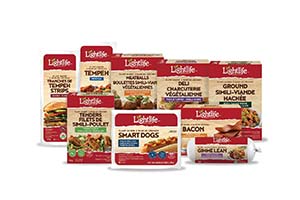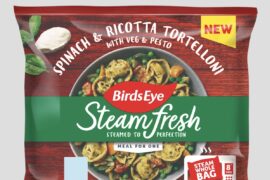 Mississauga, Ontario, Canada-headquartered Maple Leaf Foods and its wholly owned Greenleaf Foods subsidiary in the United States announced plans on April 8 to construct a US $310 million plant-based protein food processing facility in Shelbyville, Indiana. Occupying approximately 230,000 square feet (21,360 square meters), it will be the largest factory and investment of its kind in North America.
Mississauga, Ontario, Canada-headquartered Maple Leaf Foods and its wholly owned Greenleaf Foods subsidiary in the United States announced plans on April 8 to construct a US $310 million plant-based protein food processing facility in Shelbyville, Indiana. Occupying approximately 230,000 square feet (21,360 square meters), it will be the largest factory and investment of its kind in North America.
 The plant will double the company’s current production capacity and support a pipeline of innovation to meet increasing consumer demand for pea and grain-based meat alternatives and fuel market growth. It will produce items including tempeh, meat-free franks, sausages and raw foods, as well as the recently launched Lightlife Burger.
The plant will double the company’s current production capacity and support a pipeline of innovation to meet increasing consumer demand for pea and grain-based meat alternatives and fuel market growth. It will produce items including tempeh, meat-free franks, sausages and raw foods, as well as the recently launched Lightlife Burger.
Construction at the 57-acre property, which has easy access to freight transport and is situated about 50 kilometers from Indianapolis, is scheduled to begin in the late spring of this year, with production start-up likely in the fourth quarter of 2020. Approximately 460 people will be employed at the facility once it is up and running.
The company, a major producer of prepared meats, ready-to-cook and ready-to-serve meals, pork and poultry in addition to plant protein offerings, will also invest approximately $26 million to keep pace with ongoing growth in demand for plant-based protein products at its existing factories.
 Michael H. McCain“With Lightlife and Field Roast, we own the leading brands in the North American refrigerated plant-based protein market,” said President and CEO Michael H. McCain. “This strategic initiative will secure our ongoing leadership in this rapidly expanding market. By establishing a large-scale network, we will continue to meet rapidly growing demand for protein alternatives and create a center of excellence for innovation. It will escalate the financial contribution of this business and advance Maple Leaf’s vision to be the most sustainable protein company on earth.”
Michael H. McCain“With Lightlife and Field Roast, we own the leading brands in the North American refrigerated plant-based protein market,” said President and CEO Michael H. McCain. “This strategic initiative will secure our ongoing leadership in this rapidly expanding market. By establishing a large-scale network, we will continue to meet rapidly growing demand for protein alternatives and create a center of excellence for innovation. It will escalate the financial contribution of this business and advance Maple Leaf’s vision to be the most sustainable protein company on earth.”
The Shelbyville facility will be supported with approximately $50 million in government and utility grants and incentives, including $9.6 million toward capital and one-time start-up costs, and approximately $40 million in 10-year operational support. Maple Leaf expects to incur one-time start-up costs of $34 million and will fund this strategic initiative through a combination of cash flow from operations and debt.
This expanded network will support the company’s growth expectations through 2024, with future expansion anticipated. It is expected to deliver return on capital for shareholders in the range of 13% to 16%, based on underlying long-term growth estimates. By 2022, the Adjusted EBITDA margin of the company’s plant-based protein network should be in line with Maple Leaf’s overall EBITDA margin target of 14% to 16% and will hopefully continue to grow in the following years as capacity utilization increases.
The acquisitions of Lightlife Foods Holding Inc. in Turners Falls, Massachusetts, and the Field Roast Grain Meat Company in Seattle, Washington, provided Maple Leaf with leading brands, a diversified product portfolio and an extensive customer base for refrigerated plant-based protein. These businesses have consistently outperformed expectations and are expected to reach full capacity utilization in 2020.
Plant-based protein is an estimated US $1 billion business in North America. Refrigerated products represent approximately 24% of the total market and delivered approximately 40% sales growth in 2018, significantly outpacing the broader category.






